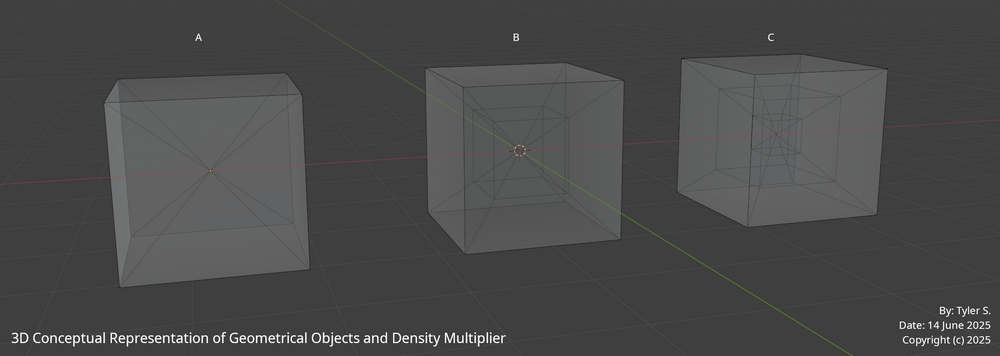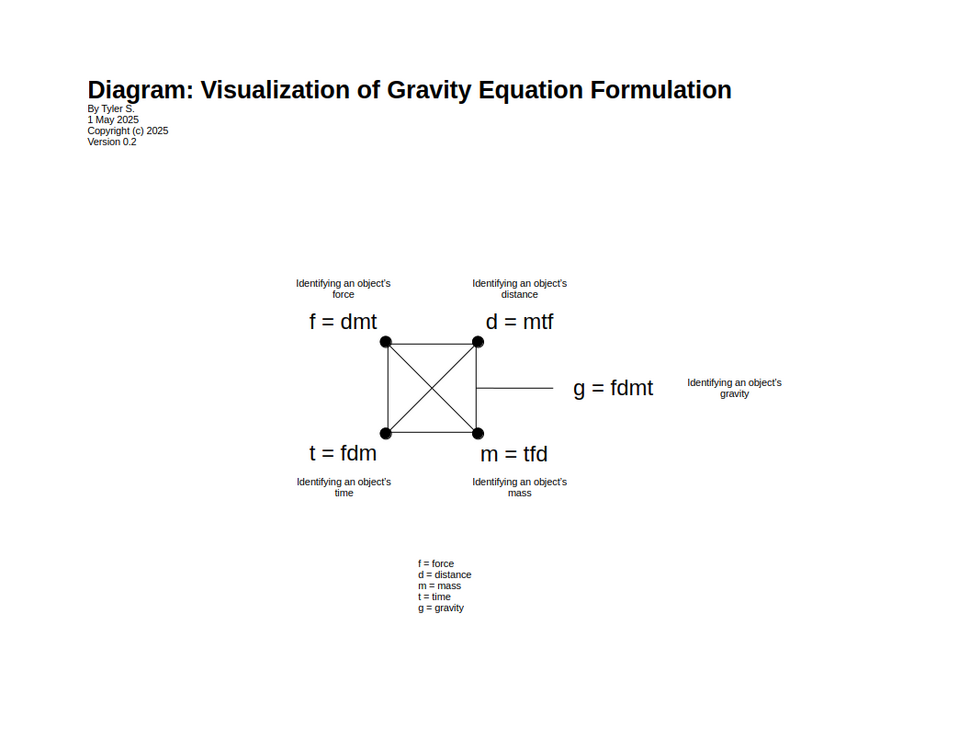Everything posted by tylers100
-
Cubic Objects with Geometrical Structure Volume and Density Question
Question Does geometrical base volume multiplied by geometrical density multiplier (or v multiplied by d) make sense? Why I'm trying to learn a bit of basic mathematics with a goal of applying it to my physics self-teach learning, with hope of better understanding the nature of geometry and gravity. Formula Cube object's base geometrical volume number (v) multiplied by geometrical density multiplier (d) so formula: v multiply by d Picture See my attached screenshot picture I took of 3-D objects I made - titled, "3D Conceptual Representation of Geometrical Objects and Density Multiplier". It was made with a 3-D software by myself, for conceptual illustration. A) 4 * 1 = 4 (A simple cube with centre.) B) 4 * 2 = 8 (A “tesseracted” cube with centre.) C) 4 * 3 = 12 (A more denser object, also with centre as well.) Similar to object's surface subdivision but different, only inside with a centre.
-
Visualizing Gravity Equation Formulation and Questions
My apologies for a slight rudeness on my last post, I should of had re-phrase it differently. I will refrain from using algebra and equations for time being as I obviously lack an understanding and proper education on using these.
-
Visualizing Gravity Equation Formulation and Questions
Fine. Perhaps not to you, but to me in a way.
-
Visualizing Gravity Equation Formulation and Questions
To mass's force (although generally so, I think), came to my mind immediately.
-
Visualizing Gravity Equation Formulation and Questions
Also to clarify something: I'm not making it up. My mind put these equation formulation together but not sure about which arrangement is correct (e.g. g = fdmt, or g = dmtf, or etc ..) the arrangement is issue I'm working on it atm. Edit: The gravity equation is the focus I meant to convey, just not sure which arrangement is correct. Granted, I should re-learn algebra again and re-work on the g equation.
-
Visualizing Gravity Equation Formulation and Questions
I'm not giving up. I thought I was, but. I learned algebra via this before: https://edu.gcfglobal.org/en/algebra-topics/ But its like my brain somehow deleted or cleared my studies on it like as if it is Internet browser cookies lol. Anyway, yeah I'm gonna re-learn it again.
-
Visualizing Gravity Equation Formulation and Questions
Thanks for replying. I tried my best to cognitize these equations but apparently to no avail, perhaps science is no longer for me to purse my interest in as it seemingly is not a right fit for me to fit myself into. I will take my leave or depart from this science and I wish you ladies and gentlemen good luck with it. Mimicking Spock's voice with right hand up in air while uttering: "Live long and prosper."
-
Visualizing Gravity Equation Formulation and Questions
Introduction I think most of you are familiar with Newton Issac and Albert Einstein's gravity theory which seem to involving gravitational relationship between objects, whereas this I approach is singular (focus on an object or object's gravitational individuality as possibly fundamental which relation / relativity (e.g. general relativity theory) happen possibly because of it. Diagram A diagram of the gravity equation formulation developed by myself as part of self-learning with the gravity within both classical physics and quantum physics although is singular for time being, supposedly applies to an individual object - but not yet approach relation / relativity (e.g. general relativity). I'm still not fully certain and also, it could be wrong and may need a refinement or discard if all of it found to be wrong. Mental Picture and Question Q1: I can mentally picture that gravity equation formulation on the diagram (i.e. visualization) I developed but not mathematics yet though and sometime I can still get a bit confused by these equations even if I developed these myself. I wonder if there is any mathematician or physicist here that is an expert in reading and understanding it, and see if any of it make sense or not? Diagram Elaboration It depicts a square with four dots connecting each other with their respective and affixed possible equations constituting a possible gravity equation. Q2: Is it possible to add an exponentiation ^2 or similar to it to the gravity equation, for its density somehow? Additional Comment I think the gravity equation formulation (five of these on the diagram) I developed is 'placeholder' for any possible mathematical operation yet to be perform on these.
-
Expanding pictures to full size
Try click on attached picture then once it becomes overlay infront or displayed, then click on it (the picture) again to zoom in. It still seem to work for me when I went back to the basics of gravity last post of mine with attached picture in order to test.
-
Project to suck carbon out of sea begins in UK
I wonder how difficult can to make co2 'filter' sponge(s) for both air and ocean / seawater and then feed it to plants?
-
Early Morning Club
Good morning. I had two medium-sized pizza pitas for breakfast, not bad. I had a bit of thought about the part of my thinking or cognition nature in regards to the science subject. I realized a majority of time I do visualization of physics when I try to tackle science subject or some topics part of it, but is rational thinking a part of that (e.g. my visualization))? Maybe but I don't seem to articulate specifically that rational or logic thinking. A bit of introspection with myself going on, I think. I'm thinking a possible field that might or may best suit for me in science if there is any; conceptual visualization of (insert topics or subjects). Is there such one that is formal in science? To elaborate a bit further, I know there can be or have some visualizations but are physically based with input feedback of mathematics or something like that to make it more accurate or correct. But what I'm talking about is prior or a starting point; a beginning of inspiration to invoke an idea arising possibility (or later found to be impossible etc) - akin to conjecture or speculation or even innovation.
-
Project to suck carbon out of sea begins in UK
If suck in more co2 storage, could that mean we need more green stuff (i.e. trees etc) planted in order for the extra co2 storage to be converted into healthy air for us to breathe? I made that question because of proportional ratio, which I think possibly exist in some way, within the Goldilocks zone of habitable on mostly surface of this planet. Whereas zones or areas outside of that Goldilocks zone, are possibly not (e.g. uneven etc)? That visual or diagram picture of the sucking in co2 process seemingly make sense but that co2 storage got my attention.
-
Restorative bioengineering and genetic manipulation: The Dire-wolf case.
Chimp might perform better... experienced with typing on typewriters. lol
-
SFN Migrated and Upgraded
I noticed the following, on screenshots I took: nothing then minus sign then disappear from time to time... what is it?
-
Restorative bioengineering and genetic manipulation: The Dire-wolf case.
Take it a bit easy if its okay for me to say that, @MSC I don't think anyone here meant ill intention or something like that, its probably the category ethics this thread is under... is difficult to discuss and is close to political but not, still... If the Dire Wolves does exist, then I'm already thinking for their wellbeings.. probably should be relocated to Greenlands or something like that under observation by top animal conservation professionals or something like that.
-
Temporal Substrate Theory: Reframing Gravity and Cosmology Through Time as the Primary Medium”
Temporal phase variance, pops into my mind after some of this thread. Taken from one of Star Trek Voyager episodes (I forgot name).
-
Restorative bioengineering and genetic manipulation: The Dire-wolf case.
Also think of Jurassic Park scenario... While I think Dire Wolves seemingly are cool but bringing these back and re-introduce these into this period of time where when etc ecology / environment etc could be different to those Dire Wolves, not sure whether if adaption will occur fully? There are probably countless questions about that. I don't fully know much about bio engineering etc but just my 2 cents.
-
Could the static elecricity be considered to be a form of artificial gravity?
Weight Gain from Static Charging, paper: link: https://www.scirp.org/journal/paperinformation?paperid=122650 ^ Check out the link, I read it but do not fully understand it as I'm still learning.. but do know that it pertains to this thread minus the artificial gravity notion though.
-
Could the static elecricity be considered to be a form of artificial gravity?
I wonder if we could re-create a form of static electricity but stronger version (and hopefully safe too) of it for use onboard spacecraft and space station. I can picture mentally of an electricity that could flow through object(s) with mass then when that occur so, the object mass gain energy temporarily at a given time as long electricity flows through then surely sub-sequentially yield a stronger gravitational attraction. I imagine would have to make objects whose density have to accompany dense geometry in order to accommodate extra energy. But I'm not sure about objects' (e.g. which ore material etc) sustainability or endurance could / would be (e.g. lead to decay as natural things would do).
-
Explanation of mystery of wave-particle duality, solution of this problem
I dunno for sure until an evidence but a thought occurred to me that what if light waves emanated from a light source acquire some mass or form of particle(s) temporarily while bouncing or diffusing or something like that? Or just merely illumination of particles / mass in the way of its travel path?
-
Geo-dynamics core of planet(s) (and presumably stars as well)
Helpful A bit, I think. Although slightly very descriptive and lists quite a bit of many things to consider. I'll give this some time to absorb and think about in order to learn a bit more. Gravity Interaction and Analogy Scenario In meanwhile, see the bold sentences in above quote by you - caught my attention. That sounds like the 'median' gravity (a specific word I came up with for specific averaged out centre in gravity interaction) I was talking a bit about in an other thread of mine. It fascinates me. At this moment, I'm thinking about an objective-oriented scenario where or when a bowl is filled with some randomized food ingredients then we shake it up and observe which ingredients would tend toward bottom and others upwardly AND maybe also able to observe which these very aggregated ingredients byproduct form circulation pattern(s). I wonder if this scenario is similar or does match with the quoted and bold sentences by you? Maybe I'm thinking a bit aloud or something like that, but kinda cool thing to think about.
-
Geo-dynamics core of planet(s) (and presumably stars as well)
Thanks for answering. What we would do with a possibility of terraforming ... say, the Moon or Mars... if either of those own magnetism field is practically nearly dead? E.g. how would we amplify the density differences in those moon or planet in order to enable or increase magnetism field in those for a possible terraformation that is if it is feasible? For some reason on my mind, maybe trigger an earthquake might could do that to potentially increase a chance of magnetism field formulation or maybe not - on Moon or Mars, that is.
-
Geo-dynamics core of planet(s) (and presumably stars as well)
and So, gravity doesn't cause magnetism field but does cause a type of prior (e.g. see 2nd quote by @studiot ) to the magnetism field?
-
Early Morning Club
Just woke like an hour ago and it is nearly 1 am in the early morning time with some fogs outside atm. For some reason it (the fog) promotes or inspires me to think of an universal translator, a fictional feature of Star Trek technologies. I might make a speculation thread about that or maybe not, I dunno. I mean, I got some basic or elemental concepts pinpointed constituting that but mathematics and solidness of prove, no. Maybe I feel like talking about the universal translator, its abstracts, in words, or something like that for time being. These elemental concepts are universal, I think. Ok, maybe a Star Trek thread at a later time. Btw the ASD or "median gravity" is one of those elemental concepts, but just median notion for time being. I ate a small pizza sandwich minus sauce, it was okay. Currently emptying my 2nd coffee cup and prep to have 3rd and that's it for morning, I hope so.. don't want to get caffeinated too much, heh.
-
Early Morning Club
Good morning. One or two days ago, I realized the adaptive semi-determinism (ASD) could be a form of median gravity that seemingly emerge at midpoint between objects. And its behaviour(s) as how I can mentally picture, could be similar to how a weather form and dissolve (e.g. it is there then it is not anymore [e.g. a cold winter storm] etc). I did some mathematics pertaining to it, but I'm a bit unsure whether if mathematics I did is right or not. I might will make a separated thread about it in physics or mathematics section at later time. Not long ago I just ate a pizza pita for breakfast, it was delicious. I once joked whether if I mistaken it for a frisbee disc. Heh.





